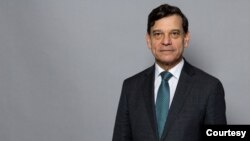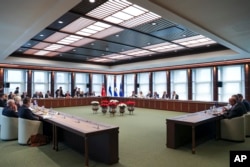Sweden, which dropped its position of military nonalignment and sought NATO membership in the wake of Russia’s 2022 invasion of Ukraine, is now one vote away from joining the alliance as its 32nd member.
On Wednesday, Henrik Landerholm, Sweden’s national security adviser, met with VOA in Washington to discuss his country’s imminent membership and his perspectives on security challenges facing the alliance in 2024.
In Landerholm’s view, if Russia prevails in its war against Ukraine, its appetite will only increase, resulting in greater security threats for a much wider region.
Landerholm said he was grateful for America’s strong support for Swedish NATO membership and is pleased the process now seems to be coming to a close. Hungary is the sole remaining NATO ally yet to ratify Swedish membership, and its National Assembly has indicated it intends to vote soon.
According to Landerholm, there is nothing left to negotiate; it is just a matter of waiting for Hungary’s ratification.
This interview has been edited for brevity and clarity.
VOA: The Turkish parliament voted yesterday to approve Sweden’s NATO membership. How does it feel and what does this mean for Sweden?
Henrik Landerholm, Swedish national security adviser: It definitely feels good. It's a confirmation that we have been on the right path and that Turkey is fulfilling its obligations — what they promised in the agreement between President [Recep Tayyip] Erdogan and Prime Minister [Ulf] Kristersson in Vilnius [Lithuania] last year. We haven't doubted that this would happen, but of course it's a good day when it happens.
VOA: And now the next step is for the president to sign the decision. Do you anticipate any complications?
Landerholm: We don't anticipate [complications] other than that it's a formality. It has to be published in the official Gazette, and then President Erdogan has to [deposit] the instruments in the State Department, as is stated in the Washington Treaty. Then, of course, the next step is Hungarian ratification. We will see what will happen.
VOA: Prime Minister [Viktor] Orban said he is inviting Prime Minister Kristersson to Budapest to negotiate. Do we know what he wants to negotiate?
Landerholm: Well, to quote my foreign minister, there is not much to negotiate. In the very kind and open letter he sent to my prime minister, [Orban] suggests a visit to Budapest, and I foresee that this will happen sooner or later. We should remember that Hungary invited Sweden [to join] NATO without any preconditions, which is a very different situation [from] Turkey, which had security concerns linked mainly to Swedish and Finnish approaches toward terrorism. We've been working with … Turkish authorities on that for about a year. With Hungary, I believe it's more of a general need to have a dialogue. We are open to such a dialogue but have noticed no preconditions or need for negotiation.
VOA: The U.S. has been very supportive of Sweden throughout this process. How was the news received here?
Landerholm: Very positive — even relief — from the U.S. side. Sweden has had strong support from the U.S. from the beginning. Sweden and Finland are more welcomed as NATO members than we ever perceived before. Speaking for Sweden, our understanding was that when Russia ... showed itself to be a predator without limits with a full-scale invasion of Ukraine, we needed to safeguard our own security. The general feeling was that we were on the demanding side, needing support from NATO.
[But the U.S.] was very clear that we were not only welcome due to the general Open Door policy, but that we would create an important addition to NATO. Over the last year, we have understood that our contributions are appreciated. We have assets that are pretty unique in the Baltics. We have military assets that few others have. Our force may not be overwhelming in size, but in quality it is second to few. We have an impressive defense industry. We have space assets, and our territory is of utmost importance for the defense of Finland and the Baltic States.
VOA: There was a perception about Turkey’s position on Swedish NATO membership that it was never about Sweden or the PKK [Kurdistan Workers’ Party, considered a terrorist group by Turkey, the United States and European Union] but about F-16s. Turkey wanted the U.S. to agree on the sale of F-16s in exchange for its consent to admit Sweden as a NATO member. What can you share with us about this debate?
Landerholm: We have not been involved in any of the discussions in that regard. From our perspective, we've done our homework in relation to Turkey. We made an agreement with Turkey in Vilnius, and since then we have just waited. They have put no extra demands on us. We take Turkish security concerns seriously. We now have good cooperation between Swedish and Turkish police, intelligence, and security services, which fulfills the expectations that Turkey has had to a large extent about PKK.
VOA: What does Swedish and Finnish membership in NATO change for Russia?
Landerholm: Well, if you listen to Russian interlocutors in general and President [Vladimir] Putin in particular, it doesn't change much. I think that's something Putin has to say, because otherwise it would be obvious to the Russian population that the invasion of Ukraine was a miscalculation.
In the long term, perhaps not in my lifetime, I’m hopeful that Russia will develop in a democratic direction. We had high hopes during the [1990s]. Those are now shattered. We cannot trust Russian goodwill anymore, and we need to seek our security in a wider context together with others.
If Russia would be successful in Ukraine, its appetite would increase further. We need to be cautious. We need to prepare. We need to rearm to prepare for, perhaps unlikely, but fully possible events. That has been the actual discussion in Sweden over the last few weeks.
VOA: More than 90% of Swedes support Ukraine in this war. What is your government doing to continue this support and now, with NATO membership, what is Sweden’s position on Ukraine as it comes to enlargement?
Landerholm: The issue of Ukraine’s NATO membership has not been an issue for us thus far, as we are not NATO members. I would not anticipate what our position would be. Ukraine eventually has a natural place in Euro-Atlantic security structures. So, it's not an issue about if, but rather about when and how.
VOA: Would it be more on the faster track side, or would it be more like the French position that says that it will take decades?
Landerholm: We haven't, as I said, taken any final decision in that regard. But we are strong supporters of Ukraine. Sweden has militarily supported Ukraine very strongly. We spent 3 billion euros over the past two years, and the majority of this in military support. If Ukraine loses the current war against Russia, it would be devastating not only for Europe in general, but also for Sweden and our adjacent area. That would give Russia an increased appetite of meddling in our affairs and trying to divide and rule among EU as well as NATO countries. Weakness is an invitation to Russia in this regard.














